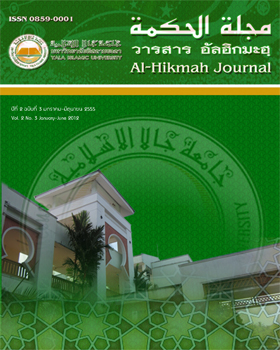อิสรภาพของตุลาการศาลอิสลามและศาลไทย
Keywords:
Court, Judge, Freedom, Islamic, Law, Justice, ComparativeLawAbstract
This article is aimed to study freedom of judge in trying and deciding the case according to Islamic law and Thai law. The article analyses the meaning and identity which demonstrate the freedom of the judge in Islamic law and Thai law. These analysis are derived from Islamic sources such as the Holy Quran, the Prophet’s tradition and relevant opinions of Muslim scholars. The analysis are also taken from Thai law sources including Constitution, Civil Procedure Code and Criminal Procedure Code which constitute as main legal sources of Thailand. The outcomes of study reveal that Islamic court is based on Islamic provisions and principles of faith to God. Therefore, the freedom of judge is protected by God. This is different from Thai court which is based on man-made law. The freedom of judge is altered according to periodic and politic development as well as system of administration. After the promulgation of the Constitution in 1997, it is recognized that Thai judges have real freedom in trying and deciding cases. It is observed that the present freedom of Thai judge which is protected by Constitution is similar to the freedom of Muslim judge which has been protected over 1,400 years ago even though the details of these two judicial systems are different.
References
ประมวลกฎหมายวิธีพิจารณาความแพ่ง และประมวลกฎหมายวิธีพิจารณาความอาญา
รัฐธรรมนูญแห่งราชอาณาจักรไทย พ.ศ. ๒๕๔๐
ราชบัณฑิตยสถาน. 2542. พจนานุกรมฉบับราชบัณฑิตยสถาน. กรุงเทพ: นานมีบุคส์พับลิเคชั่นส์.
วิษณุ เครืองาม อุสาห์ โกมลปาณิก และเกษม เวชศิลป์. ม.ป.ป. เอกสารชุดวิชา กฎหมายมหาชน. เล่มที่ 1หน่วยที่ 1-7. มหาวิทยาลัยสุโขทัยธรรมาธิราช.
สมหมาย จันทร์เรือง. 2546. ระบบศาลและพระธรรมนูญศาลยุติธรรม. กรุงเทพฯ: วิญญูชนจำกัด.
หยุด แสงอุทัย. 2542. ความรู้เบื้องต้นเกี่ยวกับกฎหมายทั่วไป. พิมพ์ครั้งที่ 14 กรุงเทพฯ: ประกายพรึก.
Abu Dawud, Sulaiman ibnu al-Ashicth al-Asdiy. n.d. Sunan Abi Dawud. Dar Aihya' al-turath al-carabiyy.
Al-Zuhayliy, Muhammad. 2002. al-Tanzim al-Qadaiyy fi al-fiqh al-Islamiy. Damashk: Dar al-Fikr.
Manac al-Qitan. 1993. al-Nizam al-Qadaiyy fi al-cahdi al-Nabawiy wa cahdi al-kulafah al-Rashidah. Al-Qahirah: Maktabat al-Wahbah.
Muslim, Ibnu Hajaj al-Qushayriy al-Naysaburiy. 1992. Sahih Muslim. Dar: al-Kutub al-Islamiyyah.
Wakic. 2001. Akbar al-Qada' rajicah. Sacid Muhammad al-laham, Bayrut: calim al-kutub.
Husayn Nasara, 1993. Safhat min al-Qada' al-Islamiyy. al-Qahirah: Mannar al-carabiyy.



